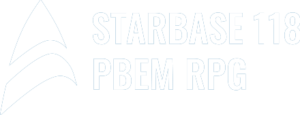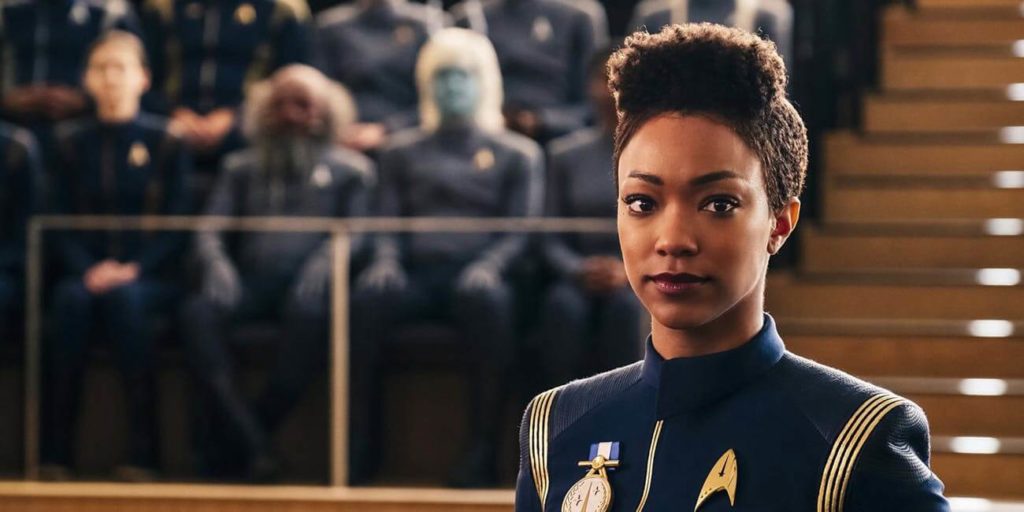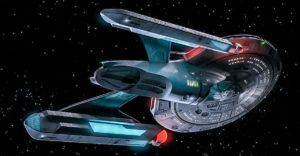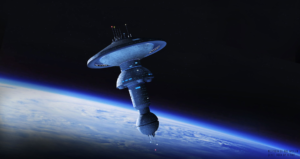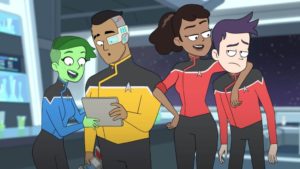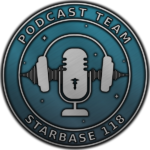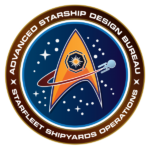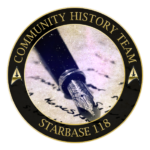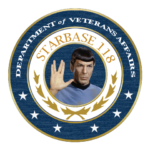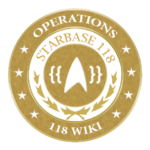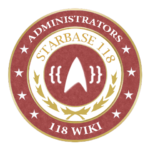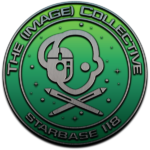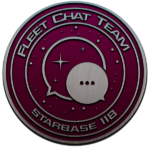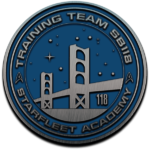Join us for another in a series of interviews with winners of awards from our recent 2022 Awards Ceremony. Our goal is to give you insight into how our fleet’s best simmers write and imagine their characters and their out-of-character contributions and achievements.
This month we’re interviewing the writer behind Rivi Vataix playing a female Betazoid Ambassador assigned to Amity Outpost. She won the Great Bird Award: “Awarded to an officer who contributes to the development and/or invention of a new method of simming, thinking, or seeing the Star Trek universe.”
DeVeau: We’ve learned a bit about you and your character from previous interviews. Would you be willing to share a bit more about yourself and delve into how you got started with TNG and eventually SB118?
Vaitax: I’d love to! In real life, I have a background in medicine and music, and after the COVID pandemic, I’m now pursuing my interest in VR development. I usually always tell folks I got into Star Trek randomly when, as a kid, I stumbled upon Mr. Worf on my TV as I flipped through channels. It was in 1994, which was the final year of TNG, but fortunately, that was the start of a new Trek renaissance in the 90s with the TNG films, DS9 and then Voyager on the air, and a thriving fan community on the growing world wide web. My first exposure to Star Trek simming actually was on those old AOL chatrooms and message boards!
I came to StarBase 118 when there were no new Trek shows being produced and while there had just been the 2009 J.J. Abrams-directed film, I wanted to revisit the prime timeline Trek universe I’d loved previously, so I searched for “Trek simming” and found a recommendation for SB118, and here I am over twelve years later!
You’ve been a commanding officer for over five years. How much has changed during your tenure, or even since you joined SB118 back in 2010?
It’s funny because when you’re in an organization for so long, it’s like being in the ocean. You don’t feel your position is changing that much, but when you look back, you suddenly realize how far out you are from the beach. That’s how it feels when I look back at where the group has gone since 2010. When I joined, I would say that the balance between players who were “role players” versus “writers” felt more towards the role-playing end. We were all writing for our characters and making stories together, but while good writing was always present from some players, the overall standard for what was acceptable to send as a finished sim was lower.
StarBase 118, as an organization, is very much driven by the “class” of captains that are leading its ships and the group in the Executive Council and Captains Council. As players who were stronger writers became captains and some of those captains became fleet leaders, a greater emphasis was put on writing well, and I would say our standards for becoming a Commander and a Captain are higher now than they were in 2010, particularly in writing quality, and this has also spread down to an individual ship level where lieutenants and lieutenant commanders are expected to write well as an example for others.
Besides the writing standards, we also expect more from how our Commanders and Captains treat one another. There used to be some rivalries between ships and personalities, but over the years, we have put a greater emphasis on fleet unity, and we scrutinize carefully the personalities and attitudes we admit to our higher ranks. Unchecked egos and toxicity have no place on our councils. The mantra that we share as COs and FOs is that a rising tide lifts all boats, and today, there is more collaboration and support between captains and ships thanks to easier communication with Discord and the forums.
What are some ways you help people with their simming?
As captain of my ship/station, it’s my responsibility ultimately that a player is ready for the next rank and position that they hope for. So whether that’s becoming a Commander or becoming a department chief, I work with my first officer and ship staff to ensure that each player gets the feedback they need to improve. What I’m personally interested in when I talk to a player is what stories they want to tell and what kind of character they want to write. I don’t want to force someone to write a story or character the way I would because then I’d just write my novel or fan fiction. Simming is about collaborative storytelling, and so I see myself more as an editor giving feedback to a writer, asking them questions to consider. Why does your character do this? If you want this to happen in the story, what’s important to tell the audience first to lead the story to that point?
Giving feedback is a skill that has to be learned and practised. We teach it when players join the ranks as ship staff members and become a mentor and when they join the training team to become certified academy instructors. It’s easy to pat someone on the back, and it’s also easy to just harshly criticize someone else without providing thoughtful criticism that makes someone want to improve. What makes great teachers, mentors, and captains is the skill to be kind but firm in helping someone see what they’ve done well and what they can improve upon and most of all, help them find a path to achieve their goals.
One thing mentioned in the award was how you spearheaded the overhaul of the wiki. Would you be willing to talk a bit about that?
“Spearheaded” is an interesting way to put it because it didn’t start as an organized effort, but just my own contributions to the wiki over the years, creating templates and redesigning pages. Eventually, in recognition of my work on the wiki, Jordan/Fleet Admiral Wolf bestowed upon me the title of “Chief of Wiki Operations,” and I asked that rather than it just be an award of acknowledgement, I’d like it to be a task force, one in which we could assemble and coordinate the efforts of other members who had a passion for documenting our stories, characters, and the history of our group on the wiki.
The most important task in maintaining the wiki is making sure that others know how to use it. I love when I see people helping others out, but I love it even more when people take the time to teach others how to make the edits themselves. Likewise, when people build new templates, it’s vital that they provide thorough documentation on how to use them. This is the mindset and wiki culture. I hope we continue to cultivate.
You were the mastermind behind the creation of the Federation New Service. Would you talk a bit about its creation and your vision for it?
The Federation News Service started as a one-off sim I wrote that was radically different from the usual perspective of my character (or even of an NPC). I wrote it as if it were an actual IC news article published by the FNS (and indeed, you can find it still on the FNS site today).
After sending it to my ship’s list, I created an FNS wiki page that basically had various IC headlines of things happening around the Federation in various categories, like sports, business, culture, and so on. The idea was that maybe it’d be something fun people could reference in their sims across the fleet, helping us have a shared non-Starfleet universe to include in our sims. Eventually, those headlines became full stories, and when we changed our ship report format from the rather dry “recap” summary format to IC news articles, the FNS had grown to where it became its own spinoff from 118, even publishing stories from other Trek RPGs and fanworks.
My vision of it was to explore the 24th century beyond just what we saw through our characters’ eyes on mostly Starfleet vessels. Today, it’s run by Em/Commander Jo Marshall and her brilliant team of editors and writers who continue its mission of fleshing out the greater Trek universe.
One of the things V’Airu mentioned was that ‘having fun and ensuring that others are having fun’ is a big part of your goal. How do you make sure the game stays fun for both yourself and for others?
It’s fundamental that captains are still having fun just as much as their crews. I’ve seen captains before falling into the trap of seeing themselves first as “ride operators” or “stage managers” helping coordinate all the action IC and OOC for others to have fun but letting their own characters and creative ambitions take a backseat or even be sidelined completely. This is where I believe you have to maintain a balance between what you want from your own “Star Trek series” that you’re running as a captain/game master and what your crew wants. You have to be open to the ideas and stories they want to tell, and honestly, those who find excitement and joy from the ideas of others–especially the unexpected ones–are those I think will last the longest in the captain’s chair.
Yet being a captain in our group is a lot of work, and one privilege of command is being the “executive producer” or showrunner. I want to support the ideas my players bring, but I also want to see how I can fit them into the overall series framework I’ve created for our game, whether it was the USS Veritas as a workhorse cruiser in a Western and Age of Piracy-inspired setting or now Amity Outpost as a sort of Trek take on West Wing/Madam Secretary in the far reaches of the Delta Quadrant.
I have found that thinking of each year of our simming group as seasons of a show has helped with planning for both my stories and my crew’s stories. I try to sketch out where I want my characters to be at the start of the season and where I want to see them at the end, along with where various mission proposals might fit into the schedule. This aspect of command is like its own game, trying to fit in all the different puzzle pieces provided by others into something cohesive. It surely isn’t always perfect in the end, but I’m proud and satisfied to look back at every year/season and see what we all built together, a storyline I certainly would not have been able to come up with on my own.
Thanks for your time, Ambassador Vataix!
You can read more about Ambassador Rivi Vataix on the wiki.
